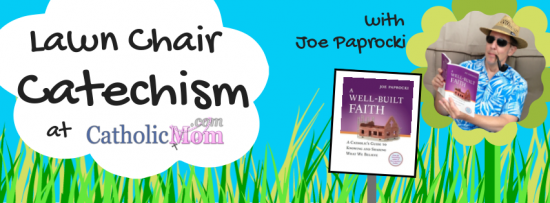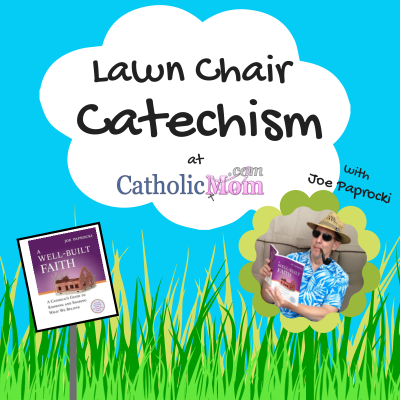Welcome to this summer’s Lawn Chair Catechism! We're reading Joe Paprocki’s best-selling book, A Well-Built Faith: A Catholic’s Guide to Knowing and Sharing What We Believe. We’re taking it one chapter at a time all summer long.

This week, we introduce Part 4: Prayer: Praying Faith. Here's Joe with an introduction:
[youtube_sc url="http://youtu.be/ZEOqdO8Wwlc"]
Have you ever played Marco Polo? (If not, here's an explanation.) It’s obvious from observing this children’s game that the person doing the calling is at a disadvantage. Unfortunately, we sometimes think that this model can be applied to our prayer life. We desperately call out for God, hope for a response, and then blindly move in that direction, hoping to make contact with God before he moves on. Thankfully, this is not at all what prayer is all about.
In this session, we will see how God is the one calling out to us, revealing his presence to us, and inviting us to respond by moving closer to him as he moves closer to us. The topic of prayer is the fourth and final pillar of the Catechism of the Catholic Church and corresponds to the P in our acronym H.E.L.P.—“Praying faith.”
What does prayer mean to you? According to the Catechism of the Catholic Church (2559), prayer is "the raising of one's mind and heart to God." There are five basic kinds of prayer:
- Adoration - acknowledging God's greatness
- Petition - asking God to address our personal needs
- Intercession - praying on behalf of the needs of others
- Thanksgiving - thanking God for all good gifts
- Praise - joyfully acknowledging that God is God
The purpose of prayer is not to influence God. Prayer does not change God. Prayer changes us.
However, that raises the question: "So then, why pray at all?"
We must know what we are praying for and know why we pray. We pray for one reason only: to align ourselves with God's will. In each situation, we are praying about something very important to us, seeking to align our will with God's. No matter how the situation turns out, God intervenes because God is always intervening.
Unfortunately, however, we tend to recognize only that intervention when God's will seemingly conforms to our own and we proclaim a miracle. Miracles do indeed occur; however, Jesus himself pointed out that the greatest miracle is the transformation of a human heart.
In every situation that we pray, we are seeking to get in touch with our deepest and truest desires, to share them with God, and to align ourselves with his will, which is always for us to draw closer to him.
So what difference does it make that Catholics believe in prayer? It means that we are confident that we are not alone—God is with us. It means we recognize that we don't have to get God's attention. Rather, we know that God is constantly seeking our attention and inviting us to respond. It means that we are in a loving relationship with the Divine, and that through this relationship we can grow in holiness. It means that God gives us the help we need to dig deep within ourselves and then life our hearts and minds to him.
Questions for Reflection and Discussion:
- What are your first memories of praying? How is it possible to pray without ceasing?
- Which form(s) of prayer—adoration, petition, intercession, thanksgiving, praise—do you rely on most often?
- What are some of the things and people that you pray for?
- What do you consider to be the purpose of prayer? What advice would you give to someone who felt that prayer was a waste of time?
Feel free to comment on your own thoughts from this week's reading, your impressions and reflections, and/or your answers to these questions. You can also share your blog post by linking up below.
Next week, we'll cover Chapter 17: Walkie-Talkies: Forms of Prayer. For the complete reading schedule and information about this summer’s Lawn Chair Catechism, visit the Lawn Chair Catechism page.

[inlinkz_linkup id=445001 mode=1]
Copyright 2014 Sarah Reinhard
About the Author

Sarah Reinhard
When she’s not chasing kids, chugging coffee, or juggling work, Sarah Reinhard’s usually trying to stay up read just one … more … chapter. She writes and works in the midst of rural farm life with little ones underfoot. She is part of the team for the award-winning Catholic Mom’s Prayer Companion, as well as the author of a number of books.


.png?width=1806&height=731&name=CatholicMom_hcfm_logo1_pos_871c_2728c%20(002).png)
Comments